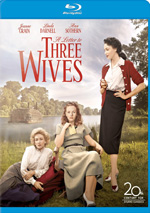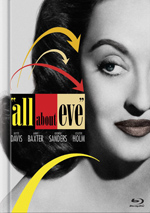|
FOX
|

| |
|
MOVIE INFO
|
|
Director:
Joseph L. Mankiewicz
Cast:
Jeanne Crain, Linda Darnell, Ann Sothern, Kirk Douglas, Paul Douglas, Barbara Lawrence, Jeffrey Lynn, Connie Gilchrist
Writing Credits:
John Klempner (novel, "Letter to Five Wives"), Vera Caspary, Joseph L. Mankiewicz
Tagline:
All of them wondered which of them wandered!
Synopsis:
Joseph Mankiewicz's unique intriguing comedy stars Ann Southern, Linda Darnell and Jeanne Crain as three wives who must wait out a long day to learn which of them has lost her husband to another woman.
Just as their boat sets off for the day, Deborah (Crain), Rita (Southern) and Lora Mae (Darnell) receive a letter from the alluring Addie Ross (narrator Celeste Holm) stating she has left town with one of their husbands. Each wife spends the fretful day pondering the state of her marriage and the affection each of their husbands has for Addie. By the end of the day, each woman is convinced she must surely be the betrayed wife.
MPAA:
Rated NR
| |
|
DVD DETAILS
|
Presentation:
Aspect Ratio: 1.33:1
Audio:
English Dolby Digital 2.0
English DTS-HD MA Monaural
Subtitles:
English
Spanish
French
Closed-captioned
Subtitles:
None
Runtime: 103 min.
Price: $24.99
Release Date: 9/17/2013
Bonus:
• Audio Commentary by Director’s Son Christopher Mankiewicz with Joseph L. Mankiewicz, Biographers Kenneth Geist and Cheryl Lower
• A&E Biography Episode “Linda Darnell: Hollywood’s Fallen Angel”
• Movietone News Footage
• Trailer
| |
|
PURCHASE @ AMAZON.COM
|

| |
|
EQUIPMENT
|
Panasonic 50" TH-50PZ77U 1080p Plasma Monitor; Sony STR-DG1200 7.1 Channel Receiver; Panasonic DMP-BD60K Blu-Ray Player using HDMI outputs; Michael Green Revolution Cinema 6i Speakers (all five); Kenwood 1050SW 150-watt Subwoofer.
| |
|
RELATED REVIEWS
|

| |
[an error occurred while processing this directive]
|
A Letter To Three Wives [Blu-Ray] (1949)
|
|
Reviewed by Colin Jacobson (October 7, 2013)
From director Joseph Mankiewicz, 1949’s A Letter to Three Wives looks like sappy “chick flick” fare but delivers a pleasant surprise. The movie quickly sets up three married couples. We meet suave and sophisticated Brad Bishop (Jeffrey Lynn) and his wife Deborah (Jeanne Crain). She’s a former country bumpkin who feels inadequate and out of place among his urbane friends.
The second of three wives is Rita Phipps (Ann Sothern), an upward-mover who works in radio. Husband George (Kirk Douglas) teaches college, and she’s the main breadwinner in the family. This causes some tensions since Rita clearly aspires to wealthier surroundings and she devotes more time to work than family.
Finally, we get to know Lora Mae Hollingsway (Linda Darnell) and her husband Porter (Paul Douglas). The most loveless of the three marriages, Lora Mae comes from underprivileged circumstances and she latched onto wealthy business owner Porter to rake in all the money and accoutrements that accompany him. The pair bicker constantly and display little affection for each other.
In the shadows lurks a ghost who haunts all three women: Addie Ross. Apparently a perfect woman, all three husbands know her and harbor affection for her. She was part of the three wives’ friendship but at the start of the film, she abruptly leaves town. After she splits, she complicates the wives’ lives when she sends them a letter that states that she’s not coming back because she ran off with one of their husbands.
The wives get this note while they chaperone a picnic with a group of children, so they can’t immediately confirm their fears. The movie shows flashbacks to depict various issues in their relationships as it builds toward a climax that reveals the truth behind Addie’s letter.
With a story that revolves around suspicions of infidelity and the fears of three married women, Letter could - and probably should - have been melodramatic swill. However, writer/director Joseph Mankiewicz ensures that this never happens. Based on the subject matter, one wouldn’t guess that Mankiewicz plays Letter for laughs; indeed, I wouldn’t call it a rollicking comedy. However, the film consistently spotlights Mankiewicz’s form of darkly humorous dialogue.
As we’ve seen in other Mankiewicz flicks like All About Eve, the director excels at societal insight, and he brings out those moments with great wit. No one’s idea of a visual director, Mankiewicz’s movies work due to the depth of the dialogue, and Letter overcomes potential sappiness due to its underlying sense of antagonism.
Conflict of some sort usually remains at the center of the film, as we see the problems that lead the women to question their relationships. The first flashback with Deborah and Brad probably becomes the most ordinary of the bunch, whereas the other two benefit from snappy patter and parodic elements.
For me, the Phipps segment fares the best. Not only do we get the issues between Rita and George, but also we find a fine mockery of cheesy radio shows and the consumerist nature of society. Mankiewicz does his best work when he digs his teeth into these topics, and the scenes crackle.
I love the fact that Letter consistently avoids any tendencies toward soap opera. I think Mankiewicz realized how easily the material could have gone down that path, so he steered it in the other direction. This doesn’t mean that it comes across as a straight parody or a soulless farce, as we buy into the characters and really do care about them. However, the film plays matters with too much of an edge to ever veer toward gooeyness.
Add a stellar cast and Letter is a real winner. A bright and brisk tale, it presents compelling characters, intriguing situations, and dynamic dialogue. On the surface, this should be a banal melodrama, but as executed, it sizzles.
|
The Blu-ray Grades: Picture A-/ Audio B/ Bonus B
|
|
A Letter to Three Wives appears in an aspect ratio of 1.33:1 on this Blu-ray Disc. This was an excellent presentation.
Sharpness came across well. Any signs of softness reflected the style of photography utilized, as the actresses sometimes got the “glamour treatment”. Nonetheless, overall definition seemed strong. No noticeable problems with jagged edges or shimmering occurred, and edge haloes stayed absent.
Grain looked light but natural, and the image lacked any form of print flaws. Black levels were nicely deep and firm, and low-light shots usually came across as smooth and well-defined. A couple of awkward day for night scenes popped up, but otherwise the shadows looked clear. I thought this became a splendid transfer.
While not as impressive, the film’s DTS-HD MA 5.1 soundtrack held up fine given its era. Speech showed its age but still came across as pretty natural; the lines lacked edginess or other problems. Effects played a minor role in this chatty flick, as they stayed in the background. Those elements were acceptably defined and clean; I noticed nothing special about them, but they lacked distortion or problems.
Music was also subdued. Only sporadic examples of score or source music popped up, and those pieces sounded reasonably clear and distinctive. They lacked much breadth, though, and didn’t add much. No background noise interfered with the audio. I thought the audio seemed more than satisfactory.
How did the Blu-ray compare the Fox Studio Classics DVD from 2005? Audio was a bit warmer and fuller, and visuals looked cleaner, tighter and smoother. Everything improved in this terrific presentation.
The Blu-ray replicates most of the DVD’s extras, and we begin with an audio commentary from Joseph Mankiewicz biographers Kenneth Geist and Cheryl Lower and director’s son Christopher Mankiewicz. All three sit separately and the track edits together their remarks. We get the usual look at the lives and careers of various actors as well as many notes about Mankiewicz.
We also learn about adapting the original text, casting, Mankiewicz’s dealings with the Production Code, and other topics connected to the film’s creation. One of the better insights looks at the way many people misinterpreted the ending and the director’s last word about that. All in all, the commentary covers appropriate topics and gives us a nice glimpse at the movie.
Next we find an episode of A&E’s Biography series entitled Linda Darnell: Hollywood’s Fallen Angel. It runs 44 minutes and three seconds and includes interviews with biographer Ronald Davis, sister Undeen Darnell Hunter, daughter Lola Marley, producer AC Lyles, film historian James Robert Parish, actresses Alice Faye and Dorris Bowdon Johnson, and actors Roddy McDowall and Richard Widmark.
Like all of the Biography episodes, “Angel” follows its subject’s ups and downs. In this case, however, the dark moments don’t seem forced, as Darnell clearly went through many bad times. We learn of all the pressure put on the actress by her pushy stage mother Pearl, and we see Darnell’s successes and failures. Alcoholism mars her career and other negatives dominate her relatively short life. The program balances the good and bad sides well and offers a solid portrait of the actress.
One Movietone News reels shows up via “Oscars Presented for Achievements in Motion Pictures”. In the one-minute, 15-second clip, we watch some celebrities arrive and check out as they hand out some prizes; Letter director/writer Joe Mankiewicz pops up there. The disc also includes a trailer for Letter.
A pleasant surprise, A Letter to Three Wives came out of nowhere and really impressed me. Granted, based on prior experiences with the work of Joseph Mankiewicz, I should have expected the zippy and amusing effort I saw, but I nonetheless took it as an unanticipated delight. The Blu-ray offers stunning visuals along with satisfying audio and some satisfying bonus materials. I recommend this solid release for an involving movie.
To rate this film visit the Fox Studio Classics review of A LETTER TO THREE WIVES
|
|

